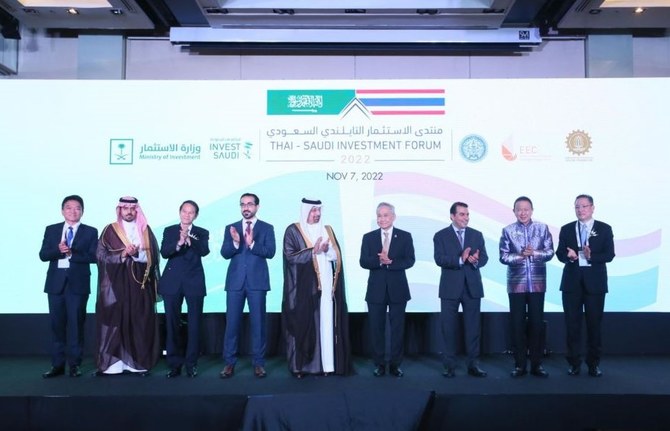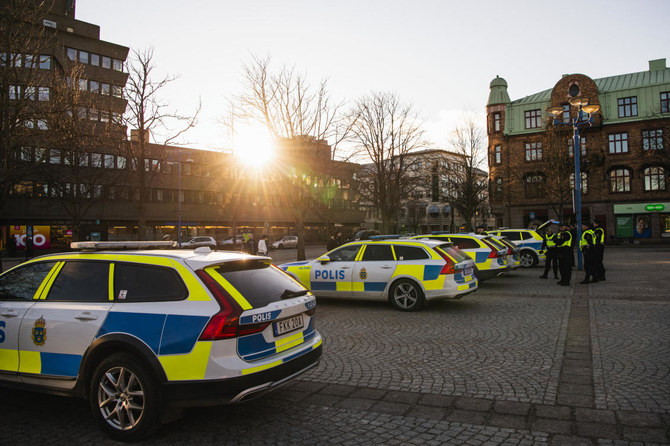BANGKOK: Authorities in Thailand on Tuesday proposed a bilateral cooperation plan to strengthen the country’s newly restored relations with Saudi Arabia, a government spokesperson said, as a high-profile investment delegation from Riyadh arrived in Bangkok.
A Saudi delegation of 150 representatives of state-owned and private enterprises led by Investment Minister Khalid Al-Falih participated on Monday in the Thai-Saudi Investment Forum organized in Bangkok by the Thai government.
A similar forum was held by Saudi authorities in Riyadh in May, following the resumption of bilateral relations earlier this year. “Today, the Ministry of Foreign Affairs has proposed a draft of a plan to strengthen bilateral relations between Thailand and Saudi Arabia in 2022 to 2024. The plan was submitted to the Cabinet and the Cabinet approved it,” Thai government deputy spokesperson Ratchada Thanadirek said in a press conference.
“The mobilization to strengthen the relations between Thailand and Saudi Arabia has been happening since the time the Thai prime minister paid an official state visit to Saudi Arabia earlier this year.
“There have been mobilizations of cooperation in trade, investment, and Thai labor export to Saudi Arabia. These have been happening continuously.”
She added that the cooperation plan would be signed with Saudi Arabia during an expected visit of Crown Prince Mohammed bin Salman this month.
The crown prince has been invited as a special guest by the Thai leadership to attend the upcoming Asia-Pacific Economic Cooperation summit in Bangkok on Nov. 18 and 19.
“The two nations will sign a memorandum of understanding between the government of the Kingdom of Thailand and the government of the Kingdom of Saudi Arabia on the establishment of the Saudi-Thai Coordination Council,” Thanadirek added.
“This will be a structure for coordination, consultation, and discussion on the topics that both Thailand and Saudi Arabia are interested in.”
Ties between Saudi Arabia and Thailand stalled in the 1980s and were renewed in late January, following Thai Prime Minister Prayut Chan-o-cha’s visit to Riyadh, on the invitation of the crown prince.
It was the first top leadership meeting between the two kingdoms in more than three decades.
Since the restoration of ties, many agreements and official visits have followed. The two governments have also signed a series of cooperation deals.
The current plan to strengthen relations covers the areas of politics, security, visa procedures, as well as energy cooperation, exports of petrochemicals, food, construction, and consumer products, and cooperation in e-sports and sports tourism.
“These will be highly beneficial to Thai business owners,” Thanadirek said.
Visit Limlurcha, vice chairman of the Thai Chamber of Commerce, who attended the Thai-Saudi Investment Forum on Monday, told Arab News that Saudi Arabia’s dependence on food imports presented opportunities for Thai producers.
Although Saudi Arabia is one of the most food-secure countries in the world, it relies heavily on imports, through which it meets about 80 percent of its food needs.
“Food is one of Saudi Arabia’s main imported goods. They really do focus on importing foods,” said Limlurcha, who also serves as the chairman of Thailand’s Processed Food and Future Food Committee.
“We have a lot of food products, apart from halal food that can serve the needs of Saudi Arabia.”
He saw export potential also in other sectors such as auto parts, cosmetics, and jewelry.
The investment that Saudi Arabia may attract from Thailand — which has long-established expertise in tourism promotion — is in the hospitality sector.
“The industry that Saudi Arabia wants Thailand to invest more is tourism and hotels. Saudi Arabia has been trying to open up their country and wants more people to visit,” Limlurcha said.
Monday’s forum, he added, gave Thai businesspeople an opportunity to do business-matching with their Saudi partners.
He said: “The atmosphere at the forum yesterday was bustling.
“The resumption of relations will give great opportunities to businesspeople in both Thailand and in Saudi Arabia. Saudi Arabia has a lot of businesspeople, who are willing to invest.
“The state of relations before made trade difficult, but now the opportunities come knocking on our door,” he added.
























